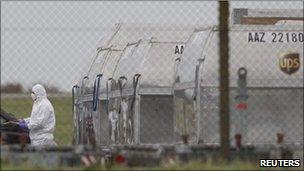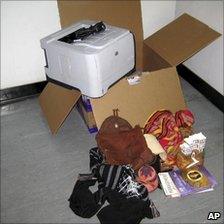New air cargo restriction imposed after bomb plot
- Published

The explosive in the device was found following an intelligence tip-off
A further restriction on air cargo has been imposed following the recent interception of bombs, Transport Secretary Philip Hammond says.
Over 30 "trans-shipment" screening exemptions had been revoked, he said.
It means more foreign freight will be screened at UK airports before being reloaded on to onward flights.
The move follows last Friday's discovery of a bomb on a US-bound UPS cargo plane at East Midlands airport and a bomb on a FedEx plane in Dubai.
Under the current system, airlines apply for a freight exemption certificate which means cargo does not have to be screened in the UK before being flown on.
Among those airlines and routes with exemptions being revoked are flights from Islamabad, Doha, Tripoli and Mumbai.
Earlier, Mr Hammond met representatives of the air freight industry to discuss security.
At what he described as "as very constructive meeting", he said the industry repeated its "commitment to collaborate" on changes to air cargo security.
But no decisions were taken at the meeting about wider changes to screening or airport security.
Luggage ban
Unaccompanied freight flown to the UK from Somalia as well as Yemen has already been banned in the wake of the plot.
Home Secretary Theresa May told MPs this week about the ban on toner cartridges over 500g from hand baggage on UK flights.
The move was based on possible contact between al-Qaeda in Yemen and Somali terrorist groups, she said.

Two explosive devices were found on cargo planes
Speaking in the Commons, Mrs May said there was no information that another attack was imminent, but she confirmed a review of all aspects of air freight security.
BAR UK - which represents more than 80 UK airlines - and airport operator BAA have said they will work with the government on the changes.
French Interior Minister Brice Hortefeux has said that one of the two parcel bombs was defused 17 minutes before it was due to explode.
Mr Hortefeux was speaking to France-2 television but did not reveal his source for the information.
The explosive contained in the device at East Midlands was found after a tip-off and was not picked up by initial screening.
Investigators at the airport carried out a re-examination as a precaution and the bomb was found hidden in a printer cartridge posted in the Yemeni capital, Sanaa.
UK officials said the tip-off came from al-Qaeda member Jabr Al-Faifi, who turned himself in to Saudi authorities two weeks ago.